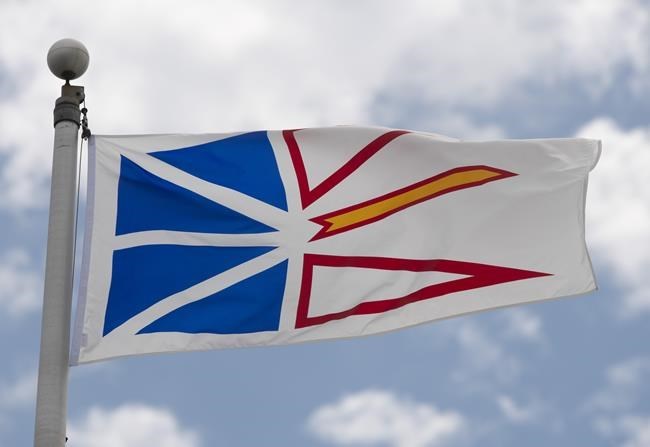
Newfoundland and Labrador's provincial flag flies on a flag pole in Ottawa, Friday July 3, 2020. THE CANADIAN PRESS/Adrian Wyld
Republished October 06, 2020 - 1:04 PM
Original Publication Date October 06, 2020 - 7:46 AM
ST. JOHN'S, N.L. - The Innu Nation of Labrador has filed a lawsuit against Hydro-Quebec seeking $4 billion in compensation for the ecological and cultural damage caused by the damming of the upper Churchill River in the early 1970s.
Senior Innu leaders said Tuesday the provincially owned utility illegally took land from the Indigenous group without consultation in the late 1960s as construction started on the Churchill Falls hydroelectric project in central Labrador.
"Hydro-Quebec has made billions of dollars from that contract, (but) it has not paid us a single penny for the damage to our land or damage to our lives, and to our people," Grand Chief Etienne Rich told a news conference in St. John's.
"We are extremely disappointed in Hydro-Quebec's refusal to take responsibility for what they have done to our people and our land .... They should have agreed long ago to compensate us for the damage they have caused. It is time for Hydro-Quebec to do the right thing. It has been 50 years. My God, it is 50 years past due!"
The massive hydroelectric project led to the creation of the Smallwood Reservoir, which flooded 6,500 square kilometres of traditional Innu territory, destroying fishing and hunting grounds, caribou habitat and ancestral graves, Rich said.
The reservoir is 1,000 square kilometres larger than Prince Edward Island.
The lawsuit, which also names the Churchill Falls (Labrador) Corporation Ltd., has been filed with the Supreme Court of Newfoundland and Labrador.
Hydro-Quebec spokesman Serge Abergel said utility officials were surprised by the statement of claim.
"We are going to take time to study it," he said. "There is a complicated historical context. It is not Hydro-Quebec that operates the power station, but we buy the energy."
The statement of claim says the project would never have been built without Hydro-Quebec's completion guarantee, which secured financing for the project.
The Innu Nation represents about 3,200 Indigenous people, most of whom live in the First Nation communities of Sheshatshiu and Natuashish.
Before the federal government moved them to the communities in the 1950s and 1960s, the Innu were a largely nomadic people who often travelled to the interior of Labrador to hunt, fish and trade.
They call the Churchill River's large watershed Nitassinan. The river itself is called Mishtashipu.
The deal to build the Churchill Falls hydroelectric project was signed between Newfoundland and Quebec in 1969, and the project was completed in 1974.
At the time, it was one of North America's largest construction projects. Its 11 turbines are part of Canada's second-largest hydroelectric generating station.
"We are and remain hunters, with a deep connection to the land," Rich said. "The area was once rich in fish and wildlife .... Our elders experienced terrible losses after the Churchill Falls generating station was built .... They lost so much, and we feel that loss today."
Lawyer Nancy Kleer, who has worked with the Innu for 30 years, said the Innu Nation is willing to negotiate a compensation agreement with the utility. But she said the lawsuit will move ahead unless a settlement is reached.
"Their traditional way of life was destroyed," she said. "Under Canadian law, no one is allowed to steal someone's land from someone else. But, that's exactly what Hydro-Quebec has gotten away with for the past 50 years by flooding and using Innu land without their permission."
The Innu never ceded their land to European settlers and no treaties were signed, Kleer said.
"They have Aboriginal title to this land," she said, noting that a formal land claim process started in the 1990s.
As well, Kleer said officials from Hydro-Quebec have for decades refused to negotiate any kind of settlement with the Innu.
She said the $4 billion claim is based on calculations suggesting Hydro-Quebec has earned $80 billion in profit from the project, with another $70 billion expected by the time the power contract with Newfoundland and Labrador expires in 2041.
In November 2011, the Newfoundland and Labrador government and its Crown-owned utility, Nalcor Energy, signed a deal with the Innu that granted the group hunting rights within 34,000 square kilometres of land, plus $2 million annually in compensation until 2041 for flooding caused by construction of the dam.
That redress agreement helped secure the Innu Nation's support for construction of the Muskrat Falls hydroelectric dam, about 200 kilometres downstream from the original project. After 2041, the agreement will provide the Innu with a share of the profits that Nalcor Energy earns from the original Churchill Falls project.
— By Michael MacDonald in Halifax. With files from Julien Arsenault in Montreal.
This report by The Canadian Press was first published Oct. 6, 2020.
News from © The Canadian Press, 2020